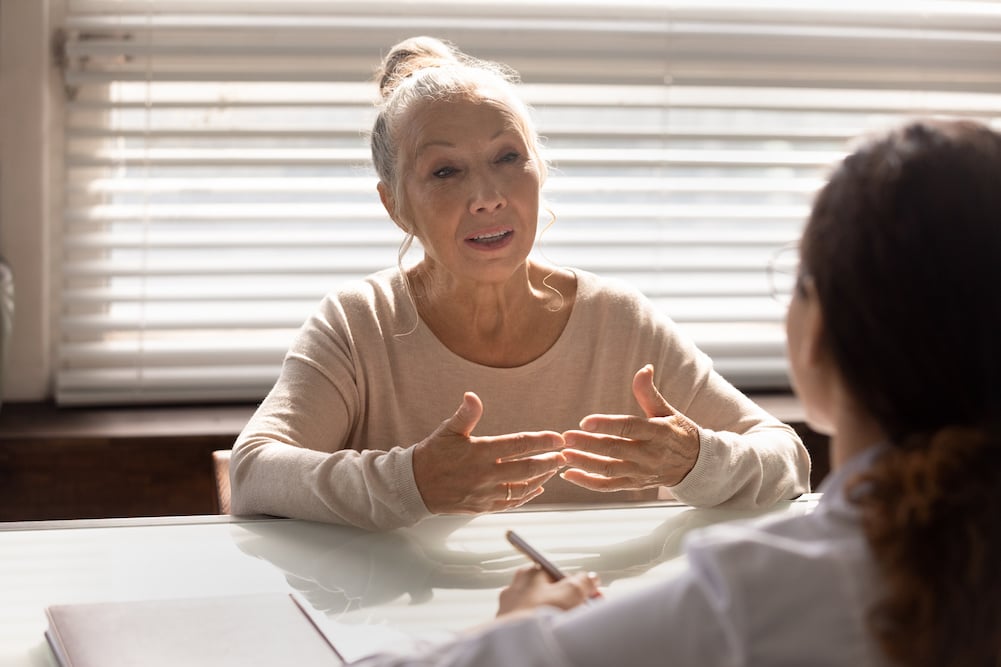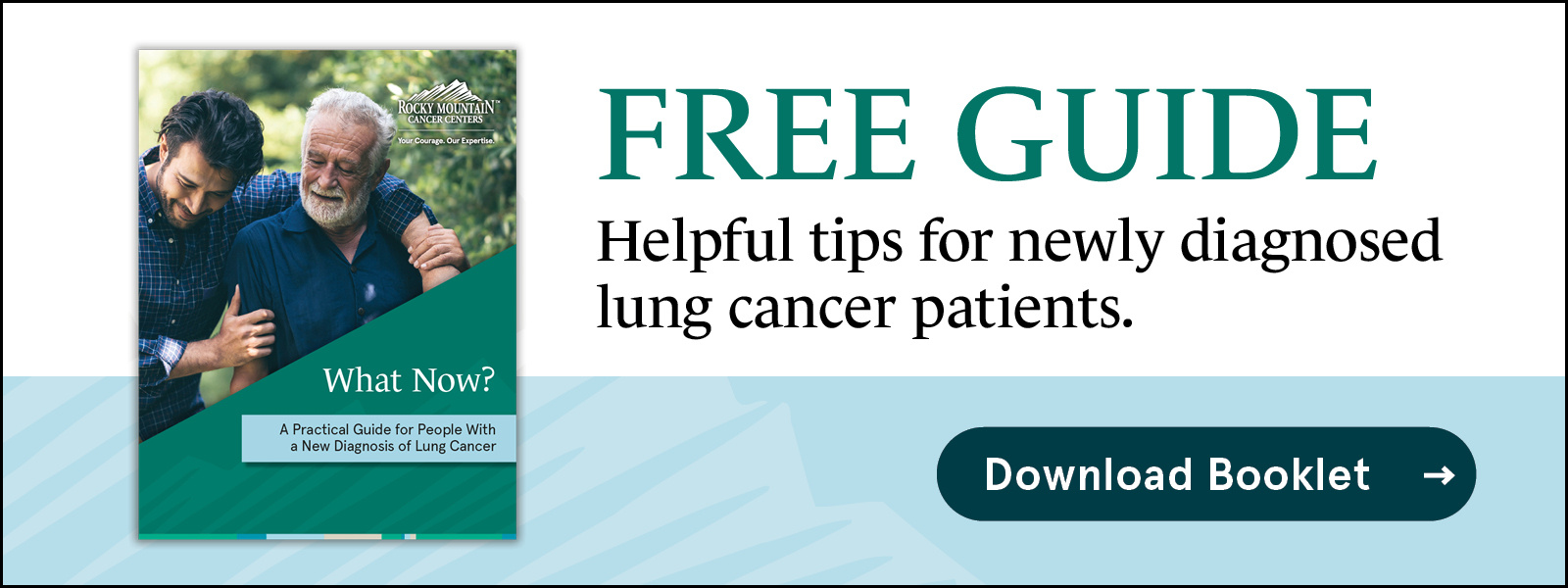7 Questions to Ask a Lung Cancer Oncologist Before Starting Treatment
7 min read

Lung cancer is a disease that can affect anyone, and receiving a diagnosis comes with many questions. If you or someone you know was recently diagnosed with lung cancer, here are some questions you may want to ask, along with an overview of what they mean. We hope these will give you a better understanding of lung cancer before you meet with a lung cancer specialist so you can prepare questions about what’s next for you.
1. What kind of lung cancer do I have?
There are two main types of lung cancer: non-small cell lung cancer (NSCLC) and small cell lung cancer (SCLC). In the United States, non-small cell lung cancer is the most frequently diagnosed type. There are three main subtypes, which are classified by the kind of cells found in the tumor:
- Adenocarcinoma, the most common sub-type of NSCLC
- Squamous cell carcinoma
- Large cell carcinoma
A less common type of lung cancer is called carcinoid.
The type of lung cancer will drive the treatment decisions your oncologist recommends.
Learn more about the types of lung cancer.
2. What is the extent of my lung cancer?
The extent of your cancer is also called the stage of cancer. It refers to the size of the tumor, its impact, if any, on lymph nodes, and whether it’s spread to areas beyond your lungs, such as the liver. The oncologist determines the stage after reviewing images, biopsy results, and other test results that give answers to how far the cancer has spread. Your oncologist uses the stage and the type of your lung cancer to choose the most effective treatments.
Small cell lung cancer staging differs from non-small cell lung cancer.
Staging Non-Small Cell Lung Cancer
The standard staging system for non-small cell lung cancer is the TNM system, which is based on three key pieces of information:
- The size and extent of the primary tumor (T)
- The spread to nearby (regional) lymph nodes (N)
- The spread (metastasis) (M) to other organs of the body
Based on this data, an overall stage ranging from stage 0 to stage IV (4) is assigned, with stage four being the most severe.
Staging Small Cell Lung Cancer
Small-cell lung cancer is described in two ways:
- Limited stage: When cancer is found in one lung or located in the tissues between the lungs and nearby lymph nodes only.
- Extensive stage: When the cancer has spread outside of the lung in which it began or to other parts of the body.
In general, early-stage lung cancers are more likely to have better outcomes than those caught at a later stage.
Related blog: Can You Recover From Stage 4 Lung Cancer?
3. What are the treatment options for lung cancer?
The treatment plan for patients with lung cancer can vary based on several factors. The most important starting point is the type of lung cancer that was diagnosed and the stage.
More advanced stages of lung cancer typically require more complex treatments. The medical oncologist will lead the treatment team in determining the best treatments and timing for each. The team includes other physicians, such as the surgeon and radiation oncologist. They will prepare a plan that includes one or more of the following:
- Surgery, along with other treatments, may be recommended for non-small cell lung cancer (NSCLC) patients whose cancer is in an early stage. Surgery is seldom used for small cell lung cancer (SCLC) as the cancer has typically already spread by the time it is detected.
- Radiation therapy is a frequently used treatment for both of the most common types of lung cancer. It may be given alone or in combination with chemotherapy (called concurrent chemoradiation). Typically, lung cancer is treated with external beam radiation therapy (EBRT), which involves using a machine to direct high-energy beams at the cancerous tumor from outside the body.
- Chemotherapy is frequently used in the treatment of small-cell lung cancer (SCLC). It may be given as the primary treatment or combined with radiation (chemoradiation). For non-small cell lung cancer (NSCLC) patients, chemotherapy is not always used. However, it may be given before surgery to reduce the size of a tumor, after surgery to eliminate any remaining cancer cells, or to treat lung cancer that has spread to other parts of the body.
- Immunotherapy drugs can be used for patients with either small cell or non-small cell lung cancer. These drugs help stimulate the body’s immune system to kill cancer cells. Multiple types of immunotherapy drugs are available and work in different ways. However, the immunotherapies currently used to treat lung cancer all belong to a class called checkpoint inhibitors.
- Targeted therapy recently became available for non-small cell lung cancer patients who are late-stage or have experienced a cancer recurrence. Targeted therapy drugs locate and attack cancer cells precisely, leaving healthy cells alone, resulting in fewer side effects than standard chemotherapy. Before receiving targeted therapy, patients must undergo biomarker testing to identify specific genetic mutations. If any are found in the testing, a targeted therapy specific to that gene’s mutation will be used.
The lung cancer specialist will discuss each treatment option's potential risks and benefits with you and how they might impact your overall health and quality of life.
Learn more about lung cancer treatment options.
4. How do you determine the best treatment plan for me?
Your type of lung cancer is the most significant factor in determining the best treatment approach. Patients with non-small cell lung cancer (NSCLC) require a different treatment plan than those diagnosed with small cell lung cancer (SCLC).
The stage of your lung cancer also plays a role in deciding which treatments you should receive. Generally, the higher the cancer stage, the more complex the treatment process.
Patients who have been diagnosed with metastatic (stage IV) or recurrent NSCLC usually undergo biomarker testing to determine the presence of genetic mutations that are responsible for the growth of cancer cells. The results of these tests help the oncologist determine whether there is a newer treatment option, such as targeted therapy, that would be effective in better targeting your specific subtype of lung cancer.
Related blog: Benefits of a Multidisciplinary Approach to Cancer Care
5. What kind of side effects can I expect from treatment?
Lung cancer and its treatments can cause several side effects that can affect your quality of life and your ability to continue with the treatment. Although there are common side effects, such as fatigue, weakness, depression, and anxiety, which are typical of most types of lung cancer treatments, individuals may experience more treatment-specific reactions in different ways and at different times.
- Radiation therapy could result in skin reactions, sore throat, shortness of breath, dry mouth, and pain at the treatment site.
- Immunotherapies may produce side effects, such as skin rashes and flu-like symptoms.
- Targeted therapies could cause patients to experience certain side effects like skin changes, high blood pressure, and diarrhea.
- Chemotherapy can result in side effects including nausea, hair loss, and nervous system problems like neuropathy and “chemo brain.”
Your oncologist and care team can provide information and support to help you manage these side effects so you can continue treatment and function in everyday life.
6. Would I benefit from participating in a lung cancer clinical trial?
Some patients with lung cancer may be eligible to participate in a clinical trial, allowing them access to new therapies for lung cancer. You will never be added to a clinical trial without your approval.
If offered the option to participate, talk with your oncologist about the risks and potential benefits and how it could change your treatment process compared to a standard treatment. RMCC currently has several clinical trials open for lung cancer patients diagnosed at various stages of the disease.
Talk with a member of your cancer care team to see if you could benefit from a clinical trial.
Learn more about Lung Cancer Clinical Trials & Research at Rocky Mountain Cancer Centers.
7. What happens after my treatments?
After you complete lung cancer treatment, it'll be time to focus on your recovery. You may have to adjust to a new normal, but we hope it involves you getting healthy and staying that way.
We can’t stress enough the importance of follow-up appointments. Don’t miss them! During these visits, your doctor will monitor your recovery, address any new symptoms or side effects, and assess whether your cancer has returned or spread. Sometimes, additional exams, imaging tests, or lab tests may be required to detect any signs of cancer recurrence or treatment side effects.
Read more about Life as a Cancer Survivor.
Lung Cancer Care Specialists in Colorado
Remember, it's important to gather information about your lung cancer treatment options before making a decision. We hope this gives you a head start on understanding lung cancer so you can discuss it with an oncologist. Our team of lung cancer doctors at Rocky Mountain Cancer Centers is ready to answer your questions and guide your treatment and recovery journey.
If you or a loved one has received a lung cancer diagnosis, request an appointment for a consultation. Rocky Mountain Cancer Centers has locations throughout Colorado's Front Range, including the Denver Area, Colorado Springs, Boulder, and Pueblo. Second opinions are also available.
